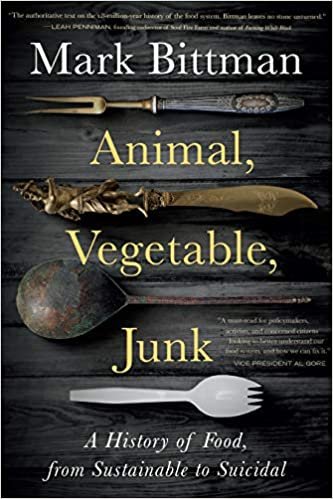by Adult Services Library Associate Beth
“This is a book about man’s war against nature, and because man is part of nature it is also inevitably a book about man’s war against himself.”
Rachel Carson

The above quote from Carson can be found in the opening to Mark Bittman’s latest book, Animal, Vegetable, Junk: A History of Food, from Sustainable to Suicidal. In his book, Bittman traces the history of agriculture from its earliest post-hunter gatherer/small-scale farming to our modern (i.e. “Western”) system which is overwhelmingly industrial, corporate and monopolized. In telling this history, Bittman demonstrates how agriculture systems were (and in many ways, still are) drivers of slavery, colonialism, and famine. And today, this food system is responsible for intensifying climate change, deteriorating the planet, and exacerbating diet-related, chronic diseases. (After all, we can’t ultimately distinguish environmental destruction from human destruction, as Carson’s quote illustrates.)
This history takes up about the first three-quarters of the book. Admittedly, it is a hard-hitting, oftentimes depressing, and exasperating read. But it’s also fascinating, thought-provoking and incredibly important. Rather than repeating that history here, however, I recommend picking up a copy of Bittman’s book yourself. And check out an upcoming program on a very similar topic! “Diet for a Large Planet”, presented by OSU History Professor Chris Otter, will look at the history of how our modern diets – diets largely reliant on red meat, white bread and sugar – developed.
The last quarter of Bittman’s book, thankfully, is much more optimistic and uplifting. After discussing all the ways our current food system is destructive and unsustainable, Bittman highlights efforts both here and abroad to create new types of food systems: fights to raise wages and improve working conditions for workers throughout our food systems, creating more local and regional food networks, transitions to farming that is less reliant of chemical fertilizers and pesticides, and national school-lunch programs that use locally sourced ingredients. And while the scale of the problem will require collective and systemic changes, Bittman offers readers ways to make changes in their own individual consumption: changing your eating habits, supporting initiatives to protect the rights of workers in the food and farm industry, and buying food from small-scale farms that use sustainable and holistic farming practices. On the topic of changing eating habits, be sure to attend our virtual program on July 14, “Eating Plants“, where Bexley residents Dr. Andrew Mills and Dr. Jessica Garrett-Mills discuss the practice and philosophy of veganism.
Bittman ends his book with the following: “We are all eaters. Providing the food we need to sustain ourselves and flourish is the single most fundamental and important human occupation. How we do it defines our present and determines our future.” With this in mind, I’m grateful to be a part of the BPL community, which offers invaluable resources and educational materials on such important topics to help learners navigate and understand the world we live in. And I’m grateful for Bittman’s book, which is such a transformative and profound read.